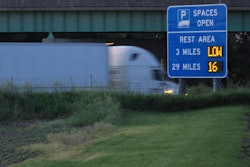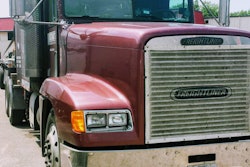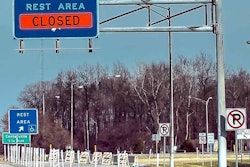Previously in this series: ELDs up the ante on parking

Of TA/Petro’s 47,021 spaces nationwide, about 5,600, or 12 percent, are reservation-only. The company’s current reservation program began in 2012 after years of meetings with drivers, says TA’s Tom Liutkus. The program’s grown recently due to “hours of service, combined with ELDs,” as well as a “general increase in our business,” he says.
On busy corridors, such as I-95 up the East Coast, half of the parking spaces at TA/Petro locations are reservation-only.
Pilot Flying J’s combined parking space footprint “is nearly double the next nearest competitor,” says Tyler Tanaka. Of the company’s total 70,000 spaces, about 5 percent are reservation-only. Of its roughly 750 locations nationwide, more than 400 offer reserved spaces, each with about five to 10. Tanaka says all the reserved spaces were established separately and were not converted from existing free spaces.
Love’s Travel Stops, meanwhile, is the largest truck stop chain that doesn’t have a reservation program. “Love’s approach to the parking shortage has been to focus on adding parking spaces,” says Jon Archard, vice president of sales.
Since the ELD mandate took effect, Love’s officials have noticed drivers starting their parking searches earlier in the day, Archard says. They’ve also seen more drivers “parking their trucks in clearly marked ‘no parking’ areas,” such as fuel islands.
In recent years, the demand for truck parking has led to facilities other than truck stops and rest areas. Owner-operator Rico Muhammad is considering becoming another of the alternative providers.
Given the sizable expansion of reserved spaces at truck stops along his most frequent lane, he says, “I’ve been kind of looking around Atlanta to see if I can find some decent land not too far off I-285,” an often-congested ring around the metro area. “Low overhead, throw some porta-potties out there and some good lighting. Might be a little cottage industry going on right there. I’m serious as a heart attack.”
Truck Specialized Parking Services currently operates a one-way-in one-way-out secured parking facility and reservation system in Detroit. Scott Grenerth, now working for the company following a stint with the Owner-Operator Independent Drivers Association as regulatory affairs director, says providing ample secure parking isn’t the low-cost affair Muhammad imagines. “Truck parking spaces are expensive,” he says. “A tractor-trailer takes up a lot of room.”
TSPS is hoping to develop a network of private spaces in what might be otherwise nontraditional locations, with reservation options via a smartphone app and/or website. “We’re looking to do that with truck stop operators and other entities,” he says. “We’d like to work with state and local governments and private industry, too — to have parking available as close as possible to where the trucker needs to be.”
 Michael Boeglin was killed in 2014 in Detroit while parked offsite near a Thyssen Krupp guard shack, unmanned after hours. Soon after his death, Scott Grenerth, then working for OOIDA, visited the site where, after a robbery, Boeglin’s truck had been burned with the hauler inside it. The bill of lading (above) found at the site “really hits home,” Grenerth says. “That is the exact same load I hauled to that place many, many times.” That load was aluminum coils from Aleris Rolled Products in Lewisport, Kentucky. Grenerth now works with Truck Specialized Parking Services, which redevelops underused commercial space into truck parking.
Michael Boeglin was killed in 2014 in Detroit while parked offsite near a Thyssen Krupp guard shack, unmanned after hours. Soon after his death, Scott Grenerth, then working for OOIDA, visited the site where, after a robbery, Boeglin’s truck had been burned with the hauler inside it. The bill of lading (above) found at the site “really hits home,” Grenerth says. “That is the exact same load I hauled to that place many, many times.” That load was aluminum coils from Aleris Rolled Products in Lewisport, Kentucky. Grenerth now works with Truck Specialized Parking Services, which redevelops underused commercial space into truck parking.The company is enabling ideas Grenerth’s long held as an ongoing member of the Federal Highway Administration’s National Coalition on Truck Parking working group: to convert unused space in or around industrial parks or warehouses into secure parking facilities.
One of the company’s founders, Scott McKenna, has been doing that for 20 years at the Detroit facility, “and in those 20 years, he’s never had the police there,” Grenerth says. “It’s not just parking, it’s exactly what Mr. Rivenburg and Mr. Boeglin needed — safe parking. … It benefits the trucker who needs a sound night’s rest and the carrier who needs to know their load won’t disappear.”
He makes reference to truckers Jason Rivenburg and Michael Boeglin, both of whom were murdered during robbery attempts while parked in nontraditional locations when safe options were unavailable (in South Carolina and Michigan, respectively).
In addition to more parking spaces, “real-time parking information” is also part of the company’s strategy. By the end of the year, TSPS will have more than 100 locations instrumented with real-time parking information available via the company’s mobile app. Grenerth hopes to announce new projects this year.
Next in this series: Could commercialization stem tide of rest area closures?











